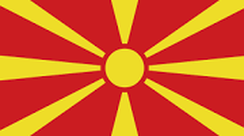- The official name of the country Република Македонија (Republika Makedonija), translated as the Republic of Macedonia. Because of a dispute with Greece over use of the name Macedonia, it is known in official circles as Поранешна Југословенска Република Македонија (Poranešna Jugoslovenska Republika Makedonija), translated as the former Yugoslav Republic of Macedonia or FYROM.
- Geography. Macedonia is a landlocked country. It is bordered by Kosovo to the northwest, Serbia to the north, Bulgaria to the east, Greece to the south, and Albania to the west. The country is clearly defined by a central valley formed by the Vardar river and framed along its borders by mountain ranges. The terrain is mostly rugged, located between the Šar Mountains and Osogovo, which frame the valley of the Vardar river.
- Conflict with Greece. The Republic of Macedonia constitutes approximately the northwestern third of the geographical region of Macedonia, which also comprises the neighboring parts of northern Greece and a smaller portion in southwestern Bulgaria. In the south, the Republic of Macedonia borders the region of Greek Macedonia. Greece's concerns are related to the ambiguity between the Republic of Macedonia, the Greek region of Macedonia and the ancient kingdom of Macedon which falls within Greek Macedonia. Greece opposes the use of the name Macedonia by the Republic of Macedonia without a geographical qualifier (such as "Northern Macedonia"). Millions of ethnic Greeks identify themselves as Macedonians, unrelated to the Slavic people who are associated with the Republic of Macedonia. Greece also objects to the use of the term Macedonian when applied to the largest ethnic group in the Republic of Macedonia, and Greece accuses the Republic of Macedonia of using symbols that are part of Greece's culture.
- Capital. The country's capital is Skopje. The city was founded The city founded by the Paeonians in the 3rd century BCE as Scupi. It is lovated in a very strategic location, in a long valley between two hills on the banks of the Vardar River, which was a vital trade route. Because of the myriad of influences in the history of the city there are many Byzantine churches and monasteries, ancient Roman aqueducts, and a large number of Ottoman mosques and other buildings.
- Etymology. The country's name is very ancient. There are three possible theories about the origin of the name Macedonia. In Greek mythology Macedon was the name for the head of the Dorian tribe that settled the region. The second theory is that it came from the Greek adjective μακεδνός (makednós) meaning high, tall, or taper, from the noun μάκρος (mákros), meaning length in both Greek and Macedonian. similar to the same Doric word meaning great or heavy. The third theory is that the name means people of the uplands in the old Macedonian language (μακι κεδόνες = maki-kedónes or high place). Based on the Greek word Makednos, that would refer to the high mountains of the area. The original Greek name for the area was Μακεδονίa (Makedonía), a kingdom named after the ancient Macedonians. The name was originally believed to have meant either highlanders or the tall ones.
- History. Neolithic civiliations have inhabited the area as far back as 7000 BCE. In ancient times the area that is now Macedonia was inhabited by the Thracians, Dardani, Enchelae, Pelagones, and Lyncestae. In 356 BCE Philip II of Macedon absorbed most of the region into the kingdom of Macedon. Philip's son Alexander the Great conquered most of the rest of the region. The Romans established the Province of Macedonia in 146 BCE. Later Slavic, Bulgar, Norman, Bulgarian, Serbian peoples settled in and/or conquered the region. Gradually, all of the central Balkans were conquered by the Ottoman Empire and remained under its domination for five centuries.
- Lake Ohrid. Lake Ohrid is considered to be one of the oldest lakes and biotopes in the world, the oldest in Europe. It was formed between 4 and 10 million years ago.
- Religion. The major religion is Eastern Orthodoxy, however Macedonia has the 5th highest porportion of Muslims in Europe. Most Muslims are Albanians, Turks, or Romani, although few are Macedonian Muslims. There is a tension between the Macedonian and Serbian Orthodox Churches which arose from the former's separation in 1967.
- Food. Macedonian cuisine is a combination of Mediterranean, Greek, Middle Eastern, Turkish, Italian, German, and Hungarian food. The warm climate is a good for vegetables (tomato, carrots, lettuce, parsley, onions, garlic), herbs and fruits (watermelon, melon, cherries, apricots, grapes, peaches). Traditional foods and drink include Šopska salad (tomatoes, white brine cheese, cucumbers & bell pepper), dairy products (kashkaval-yellow cheese, syrine - white brine cheese, yogurt), wines, beer, rakija (type of brandy), Tavče Gravče (beans in a skillet), Tarator (yogurt & cucumber cold soup), ajvar (red pepper relish), and mastika (liquer made of the resin of the mastik tree).
- Sports. The most popular sports in Macedonia include football (soccer), handball, basketball, swimming, and skiing.
FRUA is a service-marked acronym of Families for Russian and Ukrainian Adoption in use since 1994. It and the full organizational name,
Families for Russian and Ukrainian Adoption, are not to be used to describe any organization or service not related to FRUA, without permission.
Families for Russian and Ukrainian Adoption, are not to be used to describe any organization or service not related to FRUA, without permission.
© 2023 Families for Russian and Ukrainian Adoption Including Neighboring Countries






